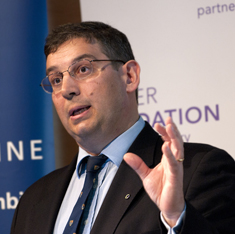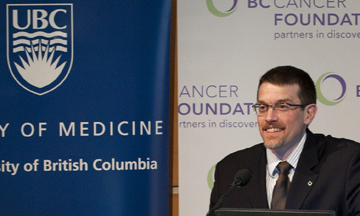Faculty of Medicine researchers have decoded the genetic make-up of triple negative breast cancer, which could lead to more effective treatment.
The study, published online April 4 in the journal Nature, reveals that this form of cancer is not one distinct single entity, but an extremely complex and evolved tumour with an unprecedented range of mutations.
The triple negative sub-type – so named for three missing proteins found in other types of breast cancer – accounts for 16 per cent of all breast cancer diagnoses and approximately 25 per cent of breast cancer deaths. Although currently treated as if it’s a single disease, this study shows that patients’ tumours vary drastically across a spectrum of cellular mutations involved in the cancer’s development.
“It’s actually extremely complex, with each cancer at a different stage in the evolutionary process at the time of diagnosis, which helps to explain why patient responses to treatment differ greatly,” said Sam Aparicio, a Professor in the Department of Pathology and Laboratory Medicine and the BC Cancer Agency Chair of Breast Cancer Research. “What’s extremely motivating with these findings is the opportunity to design clinical trials for patients with triple negative breast cancer so we can explore patient responses to treatment at the genetic level and look at ways to improve therapies and outcomes for patients.”
Operating like a mini-ecosystem, triple negative breast cancers’ genetic evolution before diagnosis may explain its ability to evade current therapies, earning it the distinction as the deadliest form of breast cancer.
Pinpointing the exact cellular mutations involved is an important first step in understanding why patients respond differently to treatment. More effective treatments come from being able to identify and target the genetic factors that play a role in the cancer’s growth.
In approximately 20 per cent of cases studied, the tumours revealed groupings of genetic mutations that already have potential clinical treatment options in the pipeline. This leads researchers and clinicians toward a future where patients’ tumours could be sequenced as a means to better direct targeted therapies.
This discovery builds on Dr. Aparicio’s landmark study of 2009 (also published in Nature) that showed for the first time how genome sequencing can be used to follow the evolution of breast cancers.
The study’s co-lead, Marco Marra, said the application of the discovery will depend, in part, on making cancer genome sequencing clinically feasible.
Dr. Marra, a Professor in the Department of Medical Genetics and Director of the BC Cancer Agency’s Genome Sciences Centre, noted that his daughter was celebrating her eighth birthday that day.
“I have to wonder, in the future, in the world she grows up in, will we be routinely reading our genomes for purposes of treatment that she may have to face one day?” he said. “I think if we go down this path of rationalizing treatment decisions based on the best and most comprehensive information, we will have taken a step in the right direction. And I hope that by the time she gets around to being an adult, that’s the world in which she’ll live.
Drs. Marra and Aparicio were joined at the announcement by their co-lead, Sohrab Shah, an Assistant Professor in the Department of Pathology and Laboratory Medicine and Associate Member of the Department of Computer Science; and Wendie den Brok, a second-year UBC medical resident who successfully overcame breast cancer as a medical student, thanks to a “last-ditch” combination of drugs.
“I am very excited about the discoveries presented here today,” said Dr. den Brok, who earned her MD from UBC in 2010. “We are seeing the results of research that have shed an incredible light as to why my cancer responded to that particular chemotherapy. Although we didn’t know it at the time, it was the right treatment targeted to a very specific period of evolution of my disease… I, and other people with this disease, as well as those who will be diagnosed in the years ahead, can take a profound comfort in knowing that the treatment strategies will become much more highly individualized and more effective.”
The study included researchers from the Cross Cancer Institute of Alberta and Cancer Research UK/University of Cambridge, and was supported by the BC Cancer Foundation, the Canadian Breast
Cancer Foundation-BC/Yukon Region and Prairies/NWT Region, the Alberta Cancer Foundation, the Alberta Cancer Prevention Legacy Fund and Alberta Innovates-Health Solutions, the Michael Smith Foundation for Health Research and Cancer Research UK at the University of Cambridge.

